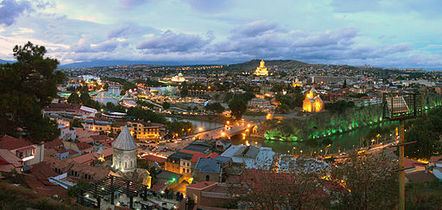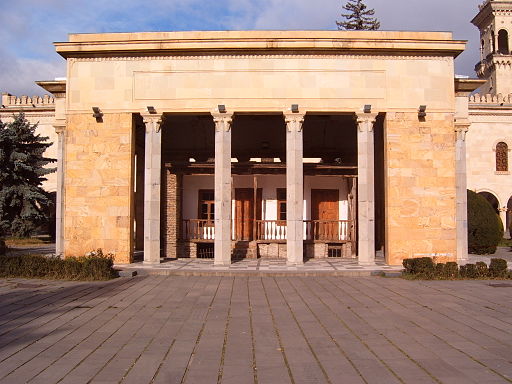The trip from Connecticut to the Fortieth International Byron Conference held in Tbilisi, Georgia this June was complicated enough as to make me admire Lord Byron for having gotten there by horse two centuries previously. As I found out at the crowded opening ceremony, Byron only dreamed of getting to Georgia—2 lines in one poem, 1 line in another.
| As the present Lord Byron said in his opening remarks that evening, the tv cameras and media following his every word, Byron’s “DNA” was finally making this trip in the poet’s honor. Both he and his cousin the Earl of Lytton attended and participated in the week-long Byron conference.. The hospitality of the Georgians was unending. I spoke the second morning, as on the first day we were offered a trip to the country that ended with an enormous out -door feast including dancing under the stars to Georgian music, Greek music, and finally rock and roll! We didn’t roll back to our Tbilisi hotel till one that morning. Still, there was Lord Lytton, Lady Byron’s direct descendant, in the first row, bright and early that next morning, to hear me discuss Sir Walter Scott’s awe of Lady Byron whose ill-fated one -year marriage to Lord Byron had ended in scandal. A reinterpretation of that marriage and Lord Byron’s angry reaction to it in his poetry will be part of my biography of “Lady Byron After Love” (W.W. Norton in Fall, 2015). |
The entire week in the Republic of Georgia was a most moving and varied experience. One day we all visited Gori where Stalin was born and toured the controversial Stalin museum which many Georgians object to and others point out as part of their heritage–Stalin remains, after all,– Georgian.
| That evening the municipality of Gori offered all eighty of us a magnificent feast. In the middle of the eating and drinking and toasting, the head of the municipality brought the news that Georgia had just signed a trade agreement with the European Union. The explosion of joy was incredible, even though we were far from the fireworks and concerts that spontaneously erupted in Tbilisi. The desire of the Georgians to be part of the West overwhelms one. Lord Byron wished to fight for Greek independence two centuries ago. In Georgia today, the poet remains the symbolic champion of political liberty. In that sense, Georgia shares the poet’s dream. |
Julia Markus
“Thence shall I stray through Beauty’s native clime,
Where Kaff is clad in rocks, and crowned with snows sublime.” –Byron, “English Bards, And Scotch Reviewers”
“Thence shall I stray through Beauty’s native clime,
Where Kaff is clad in rocks, and crowned with snows sublime.” –Byron, “English Bards, And Scotch Reviewers”
Blog first posted on the English @ Hofstra website.



 RSS Feed
RSS Feed